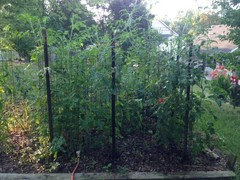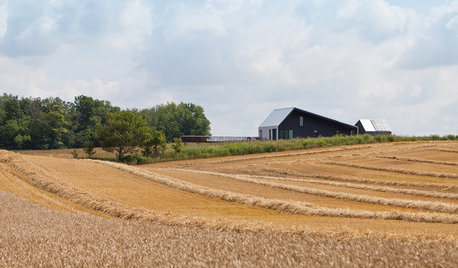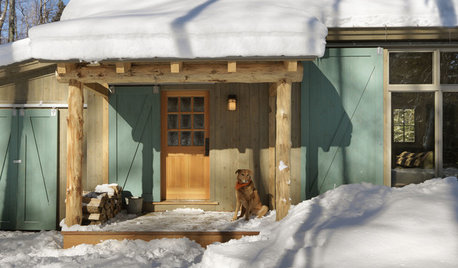Possible City Compost Problem
I've added a lot of homemade compost to my beds for many years. In recent years I've had a bad blight that I believe is fusarium. As part of my anti-fusarium campaign, I'm treating my (4-6") raised beds, one per year, by first solarizing Jun-Aug, then raising the bed by adding 8-12" of imported soil. I use a nice dark soil that collects behind a dam/culvert on my country property 15 mi. away. I mixed up the first batch last August using City compost. I don't want to use my own compost in the rehabbed beds until my place is more free of the disease.
My city composts yard waste plus clean building material scrap (unpainted wood and drywall). They screen the product and it's pretty nice stuff appearance wise. I mixed it about 50-50 by volume with soil.
Last fall I planted cool weather greens just weeks after adding the soil mix, and they did very well and part of the bed actually survived in a cold frame till spring.
This spring I planted alternating tomatoes and basil. The basil seems to be doing well and there hasn't been any sudden wilt and death (yet) so I'm keeping my fingers crossed.
The tomatoes have been mostly small and spindly, and uneven growth rates from one end of the 4x12' bed to the other. The soil was mixed with a front loader, loaded into a pickup, and shoveled out onto the bed so it should be very homogenous. I've used soluble fertilizer and it seems to help some - I'm getting some tomatoes - but compared to the other tomato bed that did not get any city compost, it's like night and day. I'll post some pics.
I did plant these tomatoes earlier than the others, I keep them all in 4" pots and watch the weather and there was a cold spell. No frost and the plants were fine but veins turned a bit purple. I figured it was just the cold. Waiting 1-2 weeks made a huge difference, or seemed to - maybe it was the soil. Can tomatoes be permanently held back for the entire season by planting when it's too cold?
I know drywall can have borax in it and boron is a plant growth inhibitor at high levels. I doubt there is manure here, it's not part of their operation, so persistent herbicides seem unlikely. Possible there was a lot of finely shredded wood that was not fully composted. But the greens did OK and the bed had all winter to finish breaking down. The soil has no sign of shredded wood now. So N depletion doesn't seem that likely.
Any ideas?
I wonder if I shouldn't just take a soil sample to the Ag lab and see what's up with the nutrients. Maybe it's a huge P deficiency or something.
Comments (44)
Jean
4 years agoPictures?
With all that compost recently and through the previous years, could be a serious excess of phosphorus.
toxcrusadr
Original Author4 years agoI did (do) have high P in the existing soil, but the new stuff was not blended into the old, so the plants are pretty much growing in that now-settled 8" of new soil. Doubtful the new soil has excess P, given its origin, or that the city compost has excess P. Quite the contrary actually. I will look up its test results.
That also does not explain why the other tomatoes in one of the old beds are doing fantastically. Last year I had peppers do very well in that same bed, after layering it the previous fall with compost, some spoiled horse feed pellets, and leaves/grass mix. Pretty standard fare around here. I've actually cut back on compost after a high P and K reading several years back. But that old bed was about half fallow and covered with volunteer garlic and purple coneflower before I cleared it out and recommissioned it to replace the bed that would be fallowed for 'the treatment'. So it's doing just fine and the only difference is the city compost, and the imported soil.
Related Professionals
Hayward Landscape Contractors · Mahwah Landscape Contractors · Ridgewood Landscape Contractors · Riverside Decks, Patios & Outdoor Enclosures · Wheaton Decks, Patios & Outdoor Enclosures · Barrington Hills Landscape Architects & Landscape Designers · Salisbury Landscape Architects & Landscape Designers · East Patchogue Landscape Architects & Landscape Designers · Peabody Landscape Contractors · Beverly Hills Landscape Contractors · Brownsville Landscape Contractors · Canyon Lake Landscape Contractors · Middleton Landscape Contractors · Midland Landscape Contractors · Four Corners Landscape Contractorstoxcrusadr
Original Author4 years agolast modified: 4 years agoHere's how they describe the compost:
"The City of Columbia operates a compost site near the Bioreactor Landfill. We collect food waste from local restaurants, grocery stores, and schools to combine with yard waste that residents dispose at one of our Yard Waste Drop-off Centers. The decomposition of these materials occur over the next 2-4 months to produce compost that is dark and nutrient-rich. The compost quality and fertility is tested every year by the University of Missouri Soil and Plant Testing Lab. "
I notice they say nothing about drywall scrap but AFAIK it's still in there.
The 2018 Batch 1 test results are as follows. That's probably what I bought, actually.
NPK 0.6, 0.06, 0.02
pH 7.91 that's kinda high
CN ratio 24.6
Ca 3.7% (there's your drywall)
Mg 0.27%
Results for the next batch are fairly close to the same.
pH of our native soil is usually slightly acidic to neutral. It's clay but the stuff I got out of the draw was a good mix of particle size washed down the creek so I'd call it loam. Which is one reason I liked it. Anyway I would think mixing that compost with native soil should have it pretty close to neutral.
toxcrusadr
Original Author4 years agolast modified: 4 years agoFirst the older bed without the soil addition:

Tomatoes 5 ft. high, a little leggy due to shade but very healthy and producing.Next the bed with new soil/compost added last fall.

Plants seem OK but they are just small and not nearly as vigorous.Size varies quite a bit from and to end, the close end in the above pic is probably a little more shady but not THAT much.

Sorry this pic is sideways, I fixed it before posting and it's still sideways and I can't seem to delete it. I've grown tomatoes in this bed before and they have not looked so anemic so something has changed.This is the best one in the bed but it's still smaller than any of the ones in the other bed.

Any thoughts?I've asked the City about drywall content and boron in the compost and waiting to hear back.
John D Zn6a PIT Pa
4 years agoI don't see a problem with the old beds plants.
I'd suggest you repeat what you did again next year, But add more city compost. You're comparing the new bed to your old bed which you had amended very well.
Myself I'd google "horse boarding Mycity St" I'd guess that 3" of manure to 12" of the soil your getting might give you excellent results. I do know that 4" to 12" is too much.
I don't like the drywall in your compost. I see no valid reason for it, other than uncontrolled contamination. But then there's the probability of municipal waste in that compost, and other forms of uncontrolled contamination.
If boron does retard vegetative growth, then that's what you have! And how will you get rid off it the future. I understand, however, that boron is useful for controlling russeting of apples. I used 2 tablespoons of borax in a sprinkler can of water for one mature tree.
glib2
4 years agocould it be yard waste - grass clippings containing herbicides? the toms are most sensitive to such a thing. If so, this is going to be as long term as the fusarium.
I know you love your toms, but I am becoming more and more minimalist, the only problem I accept is spraying the brassica with BT. Otherwise is all chicory, komatsuna, daikon, cardoon, celery, turnips, garlic, collard. All bomb proof veggies, at least here, plus komatsuna and daikon sprout in 90+ weather. and all of them grow well with just a bit of man-made urea. I pick the weeds and juice the edible ones, and I am none the worse nutrient-wise.toxcrusadr
Original Author4 years agoThey do put yard waste in, but all the accounts I hear indicate the persistent stuff is rarely used on lawns. It is a well managed and very hot composting operation so it should be biodegrading just about everything, although if the persistent herbicides are there it probably doesn't regardless of how active and hot the pile is.
I used this compost in various other places and didn't really notice anything like this. But this is the only vegetable patch, the others were places like low spots in the lawn, wildflower beds, a new bed for some aronia berry bushes, and they all seemed to do OK.glib2
4 years agonot a proof, Tox. I have whole wildflower beds within range of a black walnut, and they thrive. But put a tomato in that bed and it will die in a week. I have aronia, also laughing at the BW.I get that juglone is not clopyralid, but you should try also some beans as a cross check. they too react poorly to clopyralid and similar toxins.
kokopellifivea
4 years agolast modified: 4 years agoMight just be played out and leached out.
I grow in containers that have compost-based media. (Which irritates some people on this forum no end, I know.)
the before season soil test and the fall test were like night and day. I expect that you would experience a more subdued but similar effect in your raised beds.
toxcrusadr
Original Author4 years agoPlayed out? Fresh compost and loam soil blend that's never been gardened in? Hmm.
I've actually fertilized the new bed with a soluble 20-30-10 a couple times this year after I noticed the tomatoes were coming along really slow.. I wish it had more N and less P but our native soil can hold onto P pretty hard. And I also have a big bag of this stuff I got free. Hard to not use it.
If this compost was made last summer, by next spring it should be close to 2 years old and hopefully if there are any herbicides in there they should be pretty much gone by then.
I will try some bean seeds and see what they do.gjcore
4 years agolast modified: 4 years agoI wouldn't use city compost especially in edible garden beds. I really don't trust the public to do the right thing concerning composting. I've stopped using commercial compost, straw and hay also. My gardens have never been better. That said I do put a fair amount of time and effort into making my own compost and growing my own mulch.
toxcrusadr
Original Author4 years agoI usually don't, since I've been making compost for years and supplying my own needs, but I needed quite a bit for this cubic yard of added soil, and since I'm dealing with disease I wanted to keep my own out of the new bed(s) until I get farther ahead of the fusarium. When I bought this place, the soil was bad and we used a LOT of shredded yard waste mulch but only on the perennials and flower gardens. It did improve the soil over time but I agree with you, there was plenty of trash and weeds in it.
Their composting operation is pretty well run, the composting is hot so it kills seeds and such, and they screen the product so it looks really nice. I just figured there was not much that could come from residential yard waste that would survive the process well enough to be a problem.
The basils are getting yellow and spotty this week, I'm afraid the fusarium is getting them anyway, despite solarizing the bed and adding pristine imported soil from the woods.gardengal48 (PNW Z8/9)
4 years ago"I wouldn't use city compost especially in edible garden beds. "
Most municiple or city composting operations are very good and that is because most are rather highly regulated, both by local authorities and by the US Composting Council. And because of the size and management, they tend to be hotter, cleaner and more finished than most home composting operations.
"I just figured there was not much that could come from residential yard waste that would survive the process well enough to be a problem."
The big benefit of any composting process is its ability to neutralize contaminates and this feature is more likely to be realized through a commercial operation than it is at home.....it is just difficult for homeowners to achieve the heat necessary and for the duration necessary to breakdown whatever pathogens, pesticides or other substances that may be included. There is the possibility of persistent herbicides being included in a commercial product, especially if manures or feedstock materials are included, but most commercial operations are very careful to prohibit them.
I wouldn't hesitate for a heartbeat to use a commercial compost anywhere in my garden!! And I do frequently, as I just cannot make enough or fast enough to satisfy all my needs.
gjcore
4 years agolast modified: 4 years ago" There is the possibility of persistent herbicides being included in a commercial product" Yes that's the big problem because it only takes such a small amount to negatively affect or outright kill garden plants. All the systemic herbicides sprayed have to wind up somewhere. I'm not sure how much is sprayed annually in the US but I bet it's a LOT.
John D Zn6a PIT Pa
4 years agoAs usual I don't agree. I think animal manures when well composted are safe as a general rule. The problem with city compost is the possibility of human manure in the city product. They have to dump that stuff somewhere. You get all the obvious problems and then the chemicals and drugs that are flushed daily.
You can't make a flat rule with anything. Not all city compost has human manure, and not all animal manures may contain " the treated products that are consumed by livestock". I've corrected you before on this. I myself have raised cattle and swine and didn't apply herbicides to the pastures.
And then there's this. You just stated in the last post:
"The vast majority of herbicides (and virtually all other pesticides) are
effectively broken down into harmless compounds by the composting
process."gardengal48 (PNW Z8/9)
4 years agoIf the livestock eats grasses or pasture/feed material that has been treated with these herbicides, then any manures or compost that includes these manures will be tainted. It doesn't make one whit of difference if the manures are "well composted" or not....persistent herbicides are just that - persistent despite the composting process and for an extended period of time, often several years. And I never said that "all" manures or composted manures are contaminated - merely that the potential exists.....and to a far greater potential than in city or municiple composting operations, as they seldom include any manure or feedstock input. More rural operations may be quite different
And I challenge you to substantiate the claim that city compost contains human manure. Any city compost!! Most municipalities have very strict rules on how these items (human waste) can be handled and processed and that does not include dumping it at a commercial or city composting site! Sewage treatment facilities are vastly different and quite separate from any city composting operations, which are focused primarily on yard waste and in some cases, kitchen and restaurant vegetable waste. While there are people that do use human waste in home gardens or may compost it themselves, it is highly unlikely that any commercial composting operation would accept this material prior to it being processed.
I don't believe I stated anything as a "flat rule". And what exactly do you find confusing about that last statement? The vast majority of herbicides (and virtually all other pesticides) are effectively broken down into harmless compounds by the composting process.........is pretty self explanatory. Note the phrase "vast majority" - not all, but most.
John, I am not at all sure why you persist in attempting to negate everything I post. If you have factual disagreements, by all means post them and with any necessary substantiation. But most of what you post are very personalized, anecdotal and unsubstantated experiences or strawman arguments. They simply don't hold water.
John D Zn6a PIT Pa
4 years agoYou said:
"The vast majority of herbicides (and virtually all other pesticides)
are effectively broken down into harmless compounds by the composting
process".This applies to animal manures also.
They dump municipal waste where ever they can. And some communities have or do dump there garbage and trash into the oceans. That's where the plastics come from.
gardengal48 (PNW Z8/9)
4 years ago"This applies to animal manures also."
I never said it didn't. It just doesn't apply to livestock manures that have been exposed to those 4 persistent herbicides.
There are pretty stringent restrictions in the US on what happens to raw sewage/human waste, primarily for health concerns. Yes, on occasions there are issues with treatment faclilities (or even with flooding) that release raw sewage into streams or waterways. But the wholesale dumping of raw sewage just anywhere - or your remark about it being included in city compost - is just not valid.
John D Zn6a PIT Pa
4 years agoYou said:
"There are only 4 persistent herbicides currently on the market in US
(although sold under a variety of brand names) and none are currently
approved for any residential use. Some are even labeled as 'restricted
use', meaning they cannot be purchased (or applied) by the general
public but require a commercial applicator's license. Most are
restricted to agriculture-only settings."So Joe the farmer has an applicators license? Maybe when you buy hay you go to a huge corporate farm. In this area I can't think of a huge corporate farm let alone one selling hay to the people running horse boarding operations. I know a fella who gets application licenses, it's not cheap. He's got to get training, pass tests. The guy who sells some hay is going to use the same herbicides and pesticides as the home gardener would use.
And another thing. You obviously know nothing about the municipal waste operations. They process the sewage. At the end there are huge piles of waste that they sell as a soil amendment or fertilizer. They don't compost it. They put in 18 wheelers and haul it away.
You said:
"most of what you post are very personalized, anecdotal and
unsubstantated experiences or strawman arguments. They simply don't hold
water."Back at ya. You're going to hold against me that I raised cattle without using herbicides or insecticides. My point is that you can judge a horse boarding facility before you use their manure. I passed this spring on a site that would have very convenient to load. You consistently bash manure and mushroom compost with no consideration for those whose operations are responsible to the environment and to human health.
I have a compromised immune system. I grew potatoes this year in clay soil improved with nothing but horse manure and some chopped leafs. The improvement was done last fall. We're eating those potatoes because I have some personal experience and anecdotal evidence to know how to responsibly use manure to safely grow my crops.
gardengal48 (PNW Z8/9)
4 years agoYour persistence with this/me and all the inaccuracies and mistaken assumptions are getting us - and the OP - nowhere!
"You obviously know nothing about the municipal waste operations. They process the sewage. At the end there are huge piles of waste that they sell as a soil amendment or fertilizer. They don't compost it." I am very well aware of all of this. Processed biosolids are an important nutrient source and are used by many in their gardens or on their lawns. But this is what you said: "The problem with city compost is the possibility of human manure in the city product. They have to dump that stuff somewhere". But human manure is not processed biosolids - human manure is raw, unprocessed waste. And that does not get dumped into city composting operations. It goes through rather elaborate treatment facilities that are separate and quite distinct from any other municiple home or yard waste processing. Perhaps it is you that is not so well informed about human waste/sewage processing?
"You're going to hold against me that I raised cattle without using herbicides or insecticides."
I have no idea where this comes from. The discussion here has nothing at all to do with you or what you do or don't do with respect to the cattle or other livestock you raise. It only deals with the potentiality of the few persistant herbicides being included in commercial composting operations. If those operations prohibit or exclude manures and feedlot materials in their composting process - and many do - then the potential of contaminaton from this source is very low.
Taking phrases or parts of statements out of context and then applying your own personal experience or perspective to them is not really any sort of valid argument. All it is doing is confusing and clouding the issues being discussed. I really fail to understand your bizarre persistence with this........it makes no sense and does not promote the primary discussion nor add any additional enlightenment.
John D Zn6a PIT Pa
4 years agoThis isn't hard to understand. You have a huge problem with manure and mushroom compost I don't. You act like hay isn't used to supply us with the meat and dairy products we eat. You act like no one eats the mushrooms grown with mushroom compost. I'm a little more realistic than you are. I have a lifetime of experience with what I say. You're pushing your agenda, I have no idea why
So someone doesn't believe what you believe. That's no reason to resort to belittling those you disagree with. And I can't understand why you lie over this subject like you did with the discussion of putting mining residue, for the minerals, in bags of fertilizer.
If your bashing these products for the commercial interests, I think you're doing a lousy job.
gardengal48 (PNW Z8/9)
4 years ago"This isn't hard to understand. You have a huge problem with manure and mushroom compost I don't. You act like hay isn't used to supply us with the meat and dairy products we eat. You act like no one eats the mushrooms grown with mushroom compost. I'm a little more realistic than you are. I have a lifetime of experience with what I say. You're pushing your agenda, I have no idea why"
Yes, it IS hard to understand....because none of those statements is true. I have no problem - huge or otherwise - with manure or mushroom compost except that neither is the ideal product/garden amendment you make them out to be. They can and do have issues that can seriously affect the growth of certain plants. This is not just my perception but something that has documented scientific evidence. Where contaminated compost has been found, it has been determined that it was due to including manure derived from tainted feedstock.
I have no idea what eating dairy products or livestock fed with hay nor eating mushrooms has to do with the price of beans, but I have no objection to either.
And I have no agenda - other than accuracy of information - that I am pushing.
And I am not belittling anyone nor am I lying.....an accusation I find entirely objectionable. You just seem to have issues accepting anything other than your own limited experience despite whatever scientific evidence there is to support it.
I am done with this! Continue to live under your own misconceptions as you wish. But when you try to publicize them as factual, be prepared to find dissenting views.
John D Zn6a PIT Pa
4 years ago"I have no idea what eating dairy products or livestock fed with hay nor
eating mushrooms has to do with the price of beans, but I have no
objection to either."
Finally we agree on something. If you eat meat or dairy products, or mushrooms; then using manure or mushroom manure is safe to also use in our gardens. But I have no interest in the bean prices.It's also true that when processing sewage there's a lot of "product" that is hauled off and folks find places to use the stuff. I'd just as soon not know where all it goes. In different communities it goes to into different products. You just need to find out where in your own communities.
gardengal48 (PNW Z8/9)
4 years ago"If you eat meat or dairy products, or mushrooms; then using manure or mushroom manure is safe to also use in our gardens."
Wow!! That is perhaps the best example of disassociated logic I have seen in a long time! You are aware that one issue has absolutely nothing to do with the other? And if not, I am not going to bother to explain as I am fairly certain it will be beyond your comprehension.
btw, unless you know of some sort of mushrooms that produce excrement, there is no such thing as "mushroom manure".
John D Zn6a PIT Pa
4 years agoSo your saying the 4 problem herbicides effect the manure, but magically the milk and the meat is not effected!
I googled "herbicide effect on meat". I didn't even click on the search results, on the google page the first return states:
"When the animals consume the plants, the toxins from the herbicides are retained in their bodies. Consumption of meat
from such animals directly introduces the harmful chemicals to your
body rendering it prone to the development of ailments such as cancer.".So it's OK to eat the cancer causing meat but we shouldn't compost the manure from the same animals and dig it into the ground and grow veggies in that soil.
I would throw some of your personal insults back at you but I'm not losing this argument, besides I try not to use insults as part of logic.
It's my opinion that I would prefer not to have any contamination of any of our foods. Whether it's diary products or meats or the produce I eat. I find it hard to avoid contamination from herbicides, insecticides and commercial fertilizers. But my policy is that if I do eat the meat and dairy products then it wouldn't make sense to ban the manure from my gardens. I don't use any of these products in my gardens or even my lawn. I grew 48 feet of potatoes this year because! I no longer enjoy the skins of a baked potato and
2 I don't appreciate the fact that potatoes are treated with a chemical to prevent sprouting.
I do judge the source of my manures. It's easy to look at the pastures where I go manuring. I will admit that judging the hay by a casual look isn't easy. The last time I went the girl was hosing the hay she was about to give her horse.
Another way to look at this is if you are using herbicides, insecticides or some bag of fertilizer with unknown contents then it wouldn't make sense to avoid manure.
gardengal48 (PNW Z8/9)
4 years agoSheeesh!! The only reason I am bothering to respond to this is that maybe.....just maybe.....I can help you understand the fallacy of your logic.
If a cow or horse eats pasture grass or feed that has been treated with a persistent herbicide, that herbicide passes through the animal's gut and remains present in the manure. And if any of that manure is used in a garden setting, then it will affect the growth of many plants. That is the entire issue with persistent herbicides....the herbicides will remain active indefinitely and in a very low dosage that will have ongoing residual effects. Composting, whether included as part of a bigger commercial composting process or just as composted/aged manure, has no effect on the viability of the herbicide. That is why they are referred to as "persistent". And you cannot tell if they are present in any manure just by looking at it.
Whether you choose to drink the milk or eat the meat of livestock that consumes the treated feedstock is neither here nor there. It doe not negate the presence of the persistent herbicide that passes with the manure. As far as I know and can determine from limited research, none of these 4 persistent herbicides are poisonous if ingested (especially in whatever diluted quantity they may be present in the milk or meat) nor are they known to be carcinogenic.
Mushroom compost has very little to do with the mushrooms other than being a growing substrate. The fact that this substrate may be quite alkaline as well as having high levels of soluble salts has nothing to do with one being able to eat the mushrooms grown in it but may have a great deal to do with how well other plants can grow in soil that has been amended with it.
You cannot deduce that, because you can safely eat the meat or drink the milk, the manure is unaffected. One does not follow the other. In fact, they are completely and totally unrelated.
So go ahead and prove me wrong and win this argument. That appears to be very important to you.
John D Zn6a PIT Pa
4 years ago"You cannot deduce that, because you can safely eat the meat or drink the
milk, the manure is unaffected. One does not follow the other. In fact,
they are completely and totally unrelated."
My point is that you CAN'T SAFELY eat the meat or the dairy products. But we DO! If the meat or dairy products are giving you cancer then what the ell. Grow a few tomatoes and enjoy yourself. Or maybe this is all overblown.I'm trying to cut down on the possibilities. If I had the room I would raise some cattle, grow my own hay, grow corn and oats to feed them. Fatten them up till the meat is highly marbled. USDA choice. Use the manure to grow those crops and my veggies. But I don't have the room and I'm, too old to take on all that work. But I'm doing the best I can without using your herbicides, insecticides and your valued bags of fertilizer.
I'm going to keep on doing my thing and you're going to keep spewing your line.
toxcrusadr
Original Author4 years agolast modified: 4 years agoWow, I leave for a couple days and look what happens.
Without delving into this whole cluster, I will just point out a couple of things. GG makes a valid point that pesticides do not necessarily go equally into meat or milk products vs. manure. They certainly do not, or at least cannot be assumed to. In fact, part of the process of putting a chemical on the market, is not only determining its toxicity to humans and how it is metabolized in the animal, but where the remaining parent compound and degradates end up. This is done with animal studies using a radiolabeled (C-14 or tritium for example) version of the chemical. Thus the dose to a human consumer can be estimated, and compared to the toxicity of the chemical, to evaluate safety. I know because I worked at a lab that does those studies. I now work in environmental remediation, and I feel a lot better helping to get toxins OUT of the environment than I did helping to put them in.
As for 'human manure', my city places its (anaerobically redigested) sludge on city land or farmland, NOT in the city's compost operation. It says so right on their website and I have no reason to distrust it. Other cities will vary.
https://www.como.gov/utilities/sewer/sewer-facility-operations/treatment-process/
According to Modern Farmer, about half of municipal sludge (aka biosolids) is land-applied, much of it to farms. Some is landfilled and some is incinerated. It is not lurking in every other bag of compost on the store shelves. I think - and it would take some research to verify it - that biosolids content has to be disclosed on labels.
This whole business is a lot more complex than you are making out, John. Your own choices are up to you, but no one is 'spewing a line' here. Just talking realistically about compost. Obviously if there's excessive boron in my compost, I'm not going to be happy about it, but that doesn't make me pro or anti-chemical, and I don't think GG has some kind of an agenda either. There is room for all viewpoints in this forum.
John D Zn6a PIT Pa
4 years agoI also believe that if we eat mushrooms grown in mushroom compost then we can just as safely eat tomatoes grown in our soil that we amend with the very same mushroom compost.
When the "municipal sludge" is dumped on land there's no assurance what happens to it after that. I don't understand why on a gardening site we bash manure and mushroom manure and defend those who dump the "municipal sludge" on farm land. We unknowingly eat what's raised and grown on that farmland. I know what goes into the soil I use to grow my tomatoes.
gardengal48 (PNW Z8/9)
4 years ago" if we eat mushrooms grown in mushroom compost then we can just as safely eat tomatoes grown in our soil that we amend with the very same mushroom compost."
Of course you can! And no one said otherwise. It is not the issue of the tomato being safe to eat but whether the tomato seeds or young seedlings will be sensitive to the either the alkalinity or the level of soluble salts the mushroom compost may contain and even grow and produce.
No one is bashing anything!! All we are attempting to do is point out that these products may have issues or contain ingredients which can affect the growth of certain plants. And biosolids - your municiple sludge - is just another form of refined natural fertilizer and provides nutrients for healthy plant growth and will breakdown and disappear in just a matter of few weeks. It just tends to be much more highly regulated than either the compost or the spent mushroom substrate due to its source ingredients.
John D Zn6a PIT Pa
4 years agoSo what's important is that it's regulated.
And this: "alkalinity or the level of soluble salts the mushroom compost may contain".
I've grown tomatoes and they started showing signs of blossom end rot, which means the soil was too acid.
It seems to me the problem is that you have no personalized, anecdotal experience with growing crops. You need to widen your experiences. Get a feel for what works, how well, and what does not work.
For instance I would not grow root crops in even well composted manure, or mushroom manure. You stated, I believe in another thread, that lettuce will not grow in mushroom manure, The problem with that statement is that I would not grow lettuce in soil containing mushroom compost or manure. I would grow lettuce and root stocks in soil that was amended last year.
And much to your bewilderment, I have a receipt for 3 yards of mushroom manure from this past June.
John D Zn6a PIT Pa
4 years agoAnd then there's the organic certification question. It appears that manure, even uncomposted manure is acceptable to the USDA at this link.
I quote: "Livestock manure is a valuable resource for organic and sustainable soil management. It is most effectively used in combination with other sustainable practices such as crop rotation, cover cropping, green manuring, and liming."
The article goes on the say that it's acceptable to apply uncomposted manure if it's "Incorporated into the soil not less than 90 days prior to the harvest of a product" I wouldn't do that but apparently it's acceptable for "organic growers"
gardengal48 (PNW Z8/9)
4 years ago"It seems to me the problem is that you have no personalized, anecdotal experience with growing crops. You need to widen your experiences. Get a feel for what works, how well, and what does not work."
This is a statement you have no business in making because you have no idea what my experience is. You are making assumptions and jumping to wild - and erroneous - conclusions.
"I've grown tomatoes and they started showing signs of blossom end rot, which means the soil was too acid."
BER has very little to do with soil acidity. It is due to uneven watering practices and to a lesser extent, a calcium imbalance (often caused as a result of uneven watering). Strongly acidic soils - below 5.5 - can impede calcium uptake but the vast majority of vegetables, including tomatoes, would prefer a higher soil pH anyway.
And I will say again that unless you have some sort of unknown type of mushroom that actually produces excrement, there is no such thing as mushroom "manure" - it is either mushroom compost or spent mushroom substrate. There may not even be much actual animal manure in the ingredients before the composting process to begin with.
John, no one is disputing whatever success you have had in your gardens. If you are happy with it, great. Use whatever soil amendments or fertilizers you prefer. But please, back off with the continued responses because they are not making you come across as particularly well informed and they are becoming increasingly offensive. And I am trying to be as polite as possible.
armoured
4 years agoFor interest or reference, this has the requirements that apply to biosolids.
https://www.epa.gov/biosolids/plain-english-guide-epa-part-503-biosolids-rule
My understanding is that only those classified as exceptional quality may be available goto public eg for use in household gardens.
Note that this does not mean that city compost includes treated biosolids. Only that it could if it meets these requirements.
(my reading of the rules, please do correct me if I have misread)John D Zn6a PIT Pa
4 years agoLet's take a moment to get a handle on gardengal's desire to have animal manure's regulated. How many people would it take to regulate every deposit of animal manure, maybe we should restrict the regulation to farm animals.
There are 35,000 post office, or I should say there once was. Some zip codes might require none to one individual to collect samples for testing. Some zip codes might require a lot, those with few residents but large expances of land, some with many animals. Possibly 70, 000 individuals to collect samples. Using the rule that there should be no more than 7 employees per supervisor, would require at least 10,000 supervisors but we know multiple levels of management is required, 15,000? Then we need lab tech's to do the specimen testing. Let's start out with 10,000 lab techs. And we'll need support staff for these people and facilities. Let's suppose many of the sample takers will work out of existing facilities and start out with 5,000. This is just an estimate, we know that this will be regularly adjusted....upward.
That's 100,000 employees to make our gardens safe for American citizens. No more wandering blindly thru manure piles worrying about the quality of the poo. This is a plan that every American can stand behind, unless you worry that $10 Billion is too much money to make our gardens safe. You must remember that we have meat inspectors, but no one inspects the poo. This expense can be mitigated by placing a tax on poo. That would require agents at each facility to make sure the taxes are paid.
I will let some of you propose a name for this new administration.
gardengal48 (PNW Z8/9)
4 years ago"Let's take a moment to get a handle on gardengal's desire to have animal manure's regulated."
WTF???? Where in the world did you come up with this notion? Not once did I ever suggest such a thing!! You have now taken this from uninformed/misinformed, slightly goofy comments to the absolutely ridiculous.
John D Zn6a PIT Pa
4 years agogardengal48 said yesterday at 12:02 PM
"And biosolids - your municiple sludge - is just another form of refined
natural fertilizer and provides nutrients for healthy plant growth and
will breakdown and disappear in just a matter of few weeks. It just
tends to be much more highly regulated than either the compost or the
spent mushroom substrate due to its source ingredients."You're again resorting to personal attacks, an indication that you have nothing else to argue. You can do much better than these attacks. You maintain you're highly educated, don't do this.
The statement I just quoted indicates that you're happy using municipal sludge (human manure) but have a problem with well composted animal manure or mushroom manure after growing two crops of mushrooms which we all buy in our grocery stores.
gardengal48 (PNW Z8/9)
4 years ago"The statement I just quoted indicates that you're happy using municipal sludge (human manure) but have a problem with well composted animal manure or mushroom manure"
That statement you just quoted indicates nothing of the sort!! Once again you are taking things out of context and applying your own, pretty bizarre interpretation on them. Honestly, John, give it a rest. You are not coming across at all well.
John D Zn6a PIT Pa
4 years agoThis the statement I just quoted:
"And biosolids - your municiple sludge - is just another form of refined
natural fertilizer and provides nutrients for healthy plant growth and
will breakdown and disappear in just a matter of few weeks. It just
tends to be much more highly regulated than either the compost or the
spent mushroom substrate due to its source ingredients."I'm going to drop this thread. There's no challenge.
toxcrusadr
Original Author4 years agoI honestly can't remember the last time I ran into someone as intelligent articulate as this guy who was also able to so completely misconstrue and overinterpret what others are posting. And so impervious to attempts at correction.
John D Zn6a PIT Pa
4 years agoYou might interpret as ".....misconstrue and overinterpret what others are posting." I might see it as reading between the lines.
I see posters bashing animal manure including mushroom manure. But then they defend sewage sludge. No one grows mushrooms in human manure, well I hope not. So I wonder why? Must be an agenda, financial or political. I post my opinion, reinforced by years of experience. You call that anecdotal evidence. I agree.
Here's a picture of today's harvest:

These were grown in mushroom manure amended clay. No herbicides, insecticides. No fungicides. I did add bone meal, wood ash and lime to prevent blossom end rot.

















gardengal48 (PNW Z8/9)